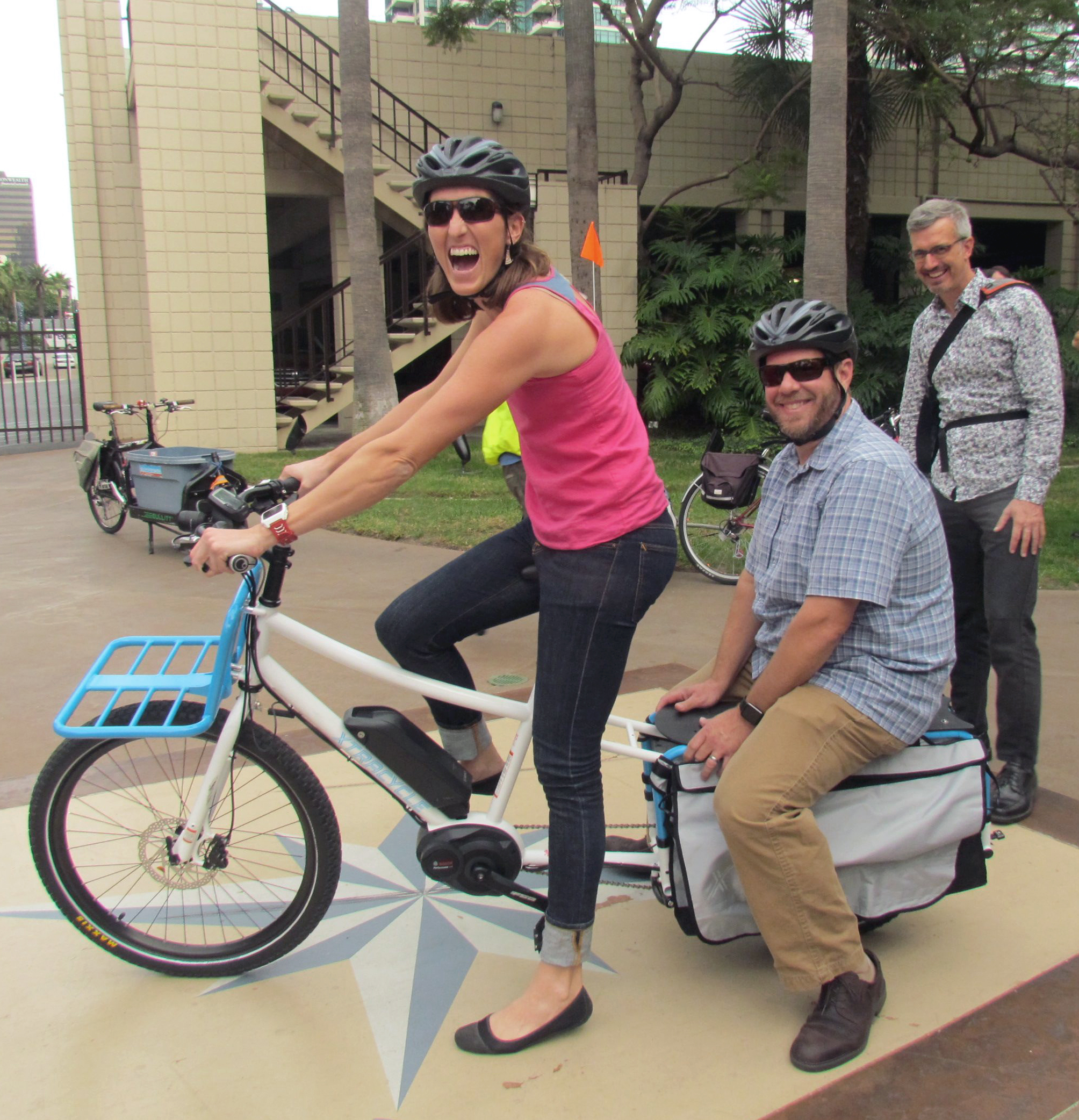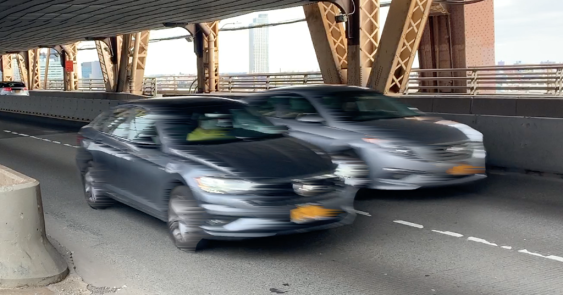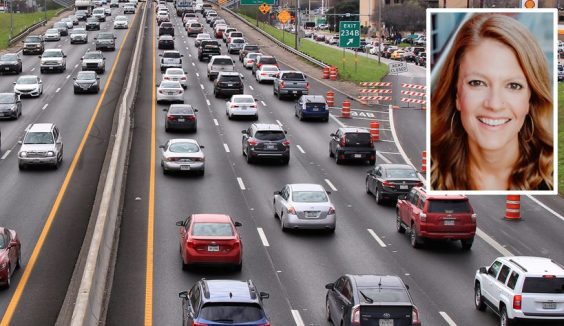Steven Cliff, from California Air Resources Board, Appointed Acting Head of National Highway and Traffic Safety
3:45 PM PST on January 22, 2021

Jeanie Ward Waller, former Caltrans Deputy Director
for Planning & Modal Programs, at a California Bicycle Summit with Dr. Steven Cliff, now executive director of CARB. Photo: Melanie Curry/ Streetsblog
Among the many encouraging changes taking place in D.C. in the first few days of President Joe Biden's administration are the appointments to top positions at transportation agencies. Pete Buttigieg has shown himself to be a thoughtful and knowledgeable candidate for Transportation Secretary; here is Transportation for America's thoughts about the nominees.
One of the more interesting appointments is of Steve Cliff, currently deputy executive officer with the California Air Resources Board, as acting head of the National Highway and Traffic Safety Administration. This interim position will give him the opportunity to begin work right away - as of February 1 - while the Biden team completes its decisions on permanent appointments, which will need Congressional approval.
NHTSA is the agency charged with vehicle safety and design, including autonomous vehicle standards and fuel economy standards, among other things. NHTSA was the lead agency pushing the federal SAFE rule, which tried to remove California's authority to set its own clean vehicle standards and set new, less restrictive federal standards.
This put it directly in opposition to CARB, where Steve Cliff has been in charge of California's programs on reducing and regulating vehicle emissions and incentives for electrification of the fleet. Not only was Cliff at the center of the fight with the previous administration over vehicle fuel efficiency standards, he had a direct hand in successfully convincing several automakers to publicly agree to abide by California's standards.
And now he is being put in charge of the agency that fought CARB every step of the way. Those fights were not little spats: over the last four years, California litigated more than fifty cases against the Trump administration for attempting to weaken clean air rules and policies.
Cliff's appointment is a strategic move that sends the unequivocal message that our new President is committed to incorporating environmental concerns in every corner of federal policy making.
At first glance, Cliff might seem an odd choice for NHTSA. He's known as a climate/clean air expert; he as a PhD in chemistry and a body of research on the effects on California's air quality from particulate matter produced in China.
At CARB he oversaw all the programs aimed at cleaning up vehicle emissions, including catching emissions cheaters, protecting California's right to set its own stricter vehicle efficiency standards, and getting automakers to agree to abide by California's higher efficiency standards.
"Having someone at NHTSA that actually has that core vision of helping reduce emissions from vehicles is pretty historic and unprecedented," according to Jared Blumenfeld, the Secretary of the California Environmental Protection Agency who worked at the US EPA under the Obama administration. "It's an issue that's not normally in their wheelhouse. It always felt like you had to drag NHTSA kicking and screaming to the table to do anything to reduce greenhouse gas emissions."
Streetsblog readers first met Steve Cliff when he was hired away from CARB to be Caltrans' first Sustainability director. While there, he helped create the new division and developed a framework for incorporating sustainability into all of Caltrans' programs. He was a strong voice in support of developing Caltrans' new direction towards a "safe, sustainable, integrated, and efficient transportation system."
He is also an advocate for bicycling and walking, recognizing that they are important aspects of a balanced transportation system. He helped push Caltrans to adopt goals to increase the portion of trips made by these sustainable modes. (Caltrans hasn't yet met those goals, but that's a story for another day).
When he returned to CARB, Cliff was put in charge of vehicle emissions, including smog testing of light, medium, and heavy duty vehicles as well as regulation and policy setting. He and CARB chair Mary Nichols met with Trump administration officials to forge a consistent federal policy on greenhouse gas emissions standards, and when it became clear that no agreement was going to happen, Cliff led negotiations with automakers to develop and agree on standards for California that could be used by other states as well.
There are three qualities that are "absolutely essential" for this position, according to Nichols, who led the development of California's climate policy after a stint at the federal EPA under the Clinton administration. "First, the ability to lead a large organization with technical expertise, where most people are not primarily policy people" but policy is a key part of their job; second, "negotiating ability, which is an art; and [third], the ability to represent the agency with the people we regulate and our constituents, to be able to explain why CARB is doing what it's doing."
"Steve has all those qualities," she said. He also has "a very strong commitment to transportation, and has been able to broaden CARB's focus beyond just vehicles, even beyond vehicles and fuels, to encompass the context as a whole. No one person can combine all the deep expertise that is necessary, but knowing what questions to ask is key."
Cliff "will be a major step forward" for NHTSA, which has had a "challenging relationship" with California - "which Steve has always handled very well," according to Nichols.
That he is Californian is also a plus. This state has literally set the standard for tailpipe emissions and fighting climate change, and Californians have first-hand experience with climate change's impacts. Cliff grew up in Napa, and has spent the last few years helping his family clean up the property around what was his childhood home there until it was destroyed by one of the state's first major wildfires, in 2017.
Also, Cliff and other appointees from California (including Ann Carlson, of the UCLA Institute of Environment and Sustainability, who was appointed chief counsel for NHTSA), "have worked in a system with a great deal more public involvement" than other states, according to Nichols. It is not as common in other states to work with a broad range of agencies to develop policy - and this is something NHTSA and other agencies will need to undertake.
"NHTSA has been bogged down on the fuel economy stuff, which is not their core mission," said Nichols. "They haven't been moving at all on standards for autonomous vehicles, which is a critical area for the industry and for the general public. They also need to go back and look at fuel economy standards to make them more reflective of the kinds of vehicles out there today." For example, she points out, Corporate Average Fuel Economy (CAFE) standards, which regulate fuel efficiency across the U.S. fleet, don't apply to electric vehicles. They also hold SUVs to a looser standard, despite their growing share of the passenger fleet.
Cal EPA's Blumenfeld applauds Biden's choice.
"I'm excited for Steve, and for California and clean air," he said. "It's amazing to have someone like Steve, who is so knowledgeable and has a deep history of dealing with automakers, in that position. He understands the complexities of the global auto and vehicle manufacturing industry--he understands how they weigh in on policy, and also how they don't."
Mitch Bainwol, who oversees government relations for Ford Motor Company, is an admirer of Cliff. Ford was one of the automakers who agreed to sign on to California's stricter efficiency standards, and Bainwol participated in the negotiations to reconcile California and the federal government on fuel standards - negotiations that, in the end, "didn't work," he said.
"I have enormous respect for Steve," he said. "He is highly skilled, and he has all the chops you would want for this role, including an ability to strike the perfect balance between aspirational policy objectives and what works at the 2000-foot level with industry. He's fair, thoughtful, tough, and not bashful about indicating his reservations about something. He is also broadly respected in the industry as someone who knows how to make the system work."
Cliff's successful experience negotiating with automakers is obviously one big point in his favor. It's also key that he understands the broader implications of the work at NHTSA, and the width of its scope: the agency will deal with tailpipe emissions and electrification of the fleet, but is also charged with regulating autonomous vehicles, which under the previous administration was left to the industry. Any larger policy moves on making vehicles safer for people not inside them will also fall under NHTSA's purview - so having an administrator there who not only understands the perspective of bike riders and pedestrians but knows we need to encourage and increase the use of those modes is crucial.
Even Ford's representative knows this. "NHTSA is a hugely significant agency, and this is probably true more now than ever before," said Bainwol. "We're on the cusp of many inflection points, with many different models of mobility, with electrification, with autonomous vehicles. You also have this moment of constructive alignment between industry and policy makers about where we're going. There is no longer a debate about whether electrification is the future - it's just not a question. And we're on the cusp of policy choices that will change this in a very real way."
Cliff both understands the industry, he says, and "has a progressive and very thoughtful perspective on the environmental side of the question. He's particularly well equipped to play a critical role at this significant time for mobility."
Bainwol believes change is coming, no matter what. "Sometimes policy is behind the curve of change, but in the current construct, policy is going to drive change," he said. And those changes will be complex and interconnected.
For example: electrification. "How the government engages to support this transformation will be totally crucial," said Bainwol. "It's not something that any one entity can do alone. Customers have to want to buy it, we have to provide the product, and the government has to provide policy to support it," he said. "Everybody’s got a role, and we have to work together."
"What's unique about Steve is he understand the levers of policy, and how businesses adjust and transform. He's got a unique capability to make a big difference."
Streetsblog California editor Melanie Curry has been thinking about transportation, and how to improve conditions for bicyclists, ever since commuting to school by bike long before bike lanes were a thing. She was Managing Editor at the East Bay Express, editor of Access Magazine for the University of California Transportation Center, and earned her Masters in City Planning from UC Berkeley.
Stay in touch
Sign up for our free newsletter
More from Streetsblog California
Bill to Require Speed Control in Vehicles Goes Limp
Also passed yesterday were S.B 961, the Complete Streets bill, a bill on Bay Area transit funding, and a prohibition on state funding for Class III bikeways.
‘We Don’t Need These Highways’: Author Megan Kimble on Texas’ Ongoing Freeway Fights
...and what they have to teach other communities across America.
Wednesday’s Headlines
Brightline LA-to-Vegas promises quick construction; LA Metro buses set to test camera enforcement of bus lane obstruction; Why are we still knocking down houses to build freeways? More
Brightline West Breaks Ground on Vegas to SoCal High-Speed Rail
Brightline West will be a 218-mile 186-mile-per-hour rail line from Vegas to Rancho Cucamonga - about 40 miles east of downtown L.A. - expected to open in 2028
CalBike Summit to Advocates: Don’t Take No for an Answer
"Persistence with kindness." "Keep trying different things." "You have to be kind of annoying." "Light up their phones."




